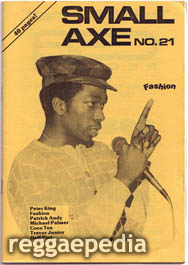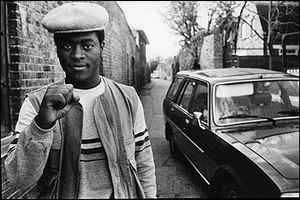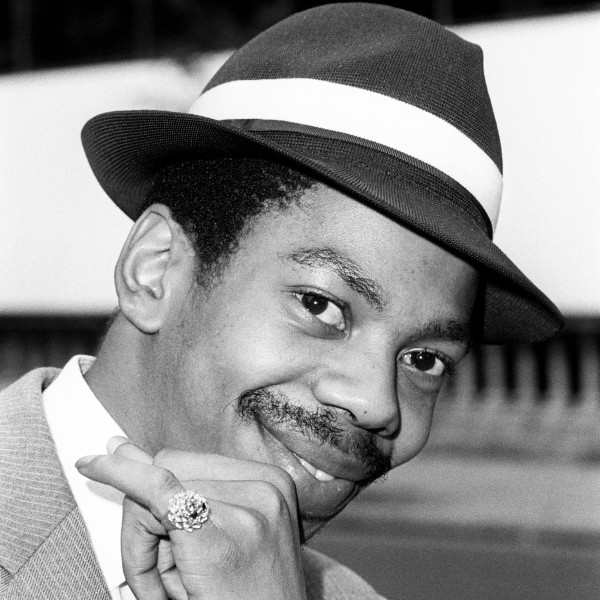The Artists The Developed Uk Fast Chat

Nearing the latter half of the golden age of reggae, as producers like Scientist and Prince Jammy unleashed some of the most iconic and enduring LPs and 12s, the UK was experiencing its own musical renaissance. Across the ocean, the UK soundsystem scene was not just thriving but also evolving, taking cues from Jamaica yet also innovating in its own right. Far from being mere imitations of their Jamaican counterparts, the UK scene was busy crafting a unique blend - a fusion of the raw energy of 'slackness' and the innovative ‘fast chat’ style of toasting.
In the midst of Scientist dropping unforgettable dub albums in 1982, such as "Scientist Rids the World of the Evil Curse of the Vampires," the UK was giving the world a taste of its own distinct flavour. Dubplates, exclusive tracks customised for individual sound systems, became the hallmark of the UK soundsystem culture. Producers like Jah Shaka and Mad Professor championed this movement with seminal albums like Mad Professor’s Dub Me Crazy and Jah Shaka’s Commandments Of Dub. But the UK's musical identity was taking on yet another layer. By 1984, with the gradual digitization of the sound and a departure from the Roots Reggae vibe, a novel rhythmic style emerged. This featured a sped-up, more aggressive mode of vocal delivery that transitioned from traditional toasting to dynamic MCing. The old guards like U-Roy and Big Youth were now sharing the stage with new legends like Yellowman, Frankie Paul, and Eek-a-mouse. This shift paved the way for a new wave, one that would inspire UK MCs to shape their own dancehall genre.
In the early 1980s, as the "fast chat" style gained momentum, UK soundsystems like Saxon Sound pioneered this approach with DJ Peter King being hailed as its originator. His contemporaries, Smiley Culture, Tippa Irie, and Papa Levi, were quick to embrace and popularise the style. The UK's vibrant soundsystem scene sought to highlight the strong cultural ties and musical influences that British-born Jamaican DJs had on the original Jamaican DJs. The beauty of this movement was that while these UK-based DJs and producers looked to Jamaica for inspiration, they didn't stop at emulation. They drove the music forward, aligning it with their unique experiences in the UK, both in content and style. The evolution was profound, leading to a new genre of music that was not just a reflection of the Jamaican diaspora in the UK but also a testament to their shared musical heritage.
This duality, this back-and-forth communication between the UK and Jamaica, is evident in the music and the stories behind it. However, when delving deeper, the acknowledgment of influence is not always clear-cut. Legendary Jamaican producer King Jammy, in his interview, noted the influence of UK DJs and sound systems on Jamaica, yet also emphasised the primacy of Jamaican DJs in the fast chat style. But regardless of who influenced whom, what remains undeniable is the power of music to bridge geographical and cultural divides.
As this article ventures further, it will spotlight those tracks that have become personal favourites and, in doing so, epitomise the unique blend of dancehall with a Roots Reggae essence—a sound that, although ephemeral, left an indelible mark on music history.
Peter King Was the Originator

Many attribute Peter King for bringing the fast chat style.
It was the song ‘Me Neat, Me Sweet’ in 1982 that is the first example of this Fast Chat style.
https://www.youtube.com/watch?v=RyX4hnT1dFE
A lot of English MCs was chatting like yardies, they weren’t trying to be original. I heard a lot of MCs copying and pirating, not entire lyrics – just the style. It all became rather the same … I did the fast style in 1982. People was already coming to Saxon but they used to love the fast style … People from other sounds used to say the “fast style” was bad. They come to me and say “drop it in now”, in the dance so that they could hear it. Everybody was doing a style off a it – just said, well, cool runnings, at least they know who originated it.”
(Echoes, 4 May, 1985).
Papa Levi Was the First Artist to Break the Jamaican Charts.

And he did not stop there. Papa Levi was arguably the most prominent of the UK MC’s with over 50 releases.
Levi's knack for stuffing a barrage of words into a single line gives off this vibe that the riddim's gone up a notch. But, spoiler alert: it hasn’t. When he suddenly hits that double-time halfway? That surge of intensity is pretty much like the wild beats in jungle, zipping along at twice the pace of the groove. It's like looking back at a song and realising there's more to it than what first meets the ear. Always surprises in the details.
It was mi god mi king which broke the charts.
https://www.youtube.com/watch?v=7faOF6C8bZg
he provided us with some of the first examples
Papa Face Incorporated that ‘Singjay’ Style to the Fast-chat

Smiley Culture & Asher Senator: The Ultimate Duo
The Two Legends in Doing it Together.
Smiley Culture & Asher Senator - Keeping a Dance (Live)
Smiley Culture

Smiley called himself and entertainer and without a doubt you can tell that in this interview. Smiley earned his nickname due to a playful game where the aim was to make girls smile. The name stuck, and so did his positive, non-slack vibes as an MC. From humble beginnings, chatting in front of his home mirror, Smiley journeyed through the evolving London sound system scene of the late '70s. Partnering with Asher Senator, the duo graced many major London dance halls, eventually making a semi-permanent residence with the renowned Saxon.
Smiley Culture optimised that slackness attitude and the story telling approach that you often found in UK reggae. It was less abstract, it was defined and clear what the song was about. A story with a beginning middle and an end.
Smiley produced two of the most critically acclaimed reggae singles of the 1980s.
Cockney Translation
This one did exactly what it says on a tin and attempts to bring the East London geezers together with Jamaican Patwa. It was a Jamaican's guide to the East End dialect: "Cockneys have names like Terry, Arfur and Del Boy/We have names like Winston, Lloyd and Leroy". The song mixed cockney dialect with London's version of Jamaican patois, translating between the two. Simon Reynolds has often cited this song in his writings, arguing that it presaged the creation of a new hybrid accent in which white East Londoners would adopt many terms of black origin.
Police Officer
https://www.youtube.com/watch?v=PCPQZ1Le6dg
A song which depicts the shit that so many of the ethnic population had to constantly deal with - being harassed/unfairly stopped, searched and questioned by the police.
Westland Helicopter
Emmanuel had chart success with his next single, "Police Officer". a supposedly autobiographical tale of how Emmanuel was arrested for the possession of cannabis, but then let off in return for an autograph when the policeman recognised him as a famous reggae artist.[To-Do Notes/Weekly Notes/2024/11-November/10|10] In spite of the subject matter – and possibly because mid-1980s radio station bosses in the UK did not understand the terms "ganja" and "sinsemilla" – the single was a Top 20 hit, selling 160,000 copies, and earned Emmanuel two appearances on BBC's flagship music programme, Top of the Pops.[1|1][4|4] The record, although humorous, did have a serious aspect, in that it highlighted the way black people are unfairly treated by the police.[11|11] He recorded a session for Janice Long's BBC Radio 1 show in December 1984,[12|12] and was featured on the covers of Echoes, Record Mirror, and the NME in early 1985. The success of "Police Officer" prompted a re-release of "Cockney Translation". It picked up considerable airplay on BBC Radio One and sold over 40,000 copies in total, but only reached the lower end of the UK Singles Chart.[4|4] His success led to an appearance at the Reggae Sunsplash festival in Jamaica in 1985.[13|13]
The sad irony was that on March 15th, this legend, or do so much for music, pioneer rap in the UK, directing the Reggaa scene into something unique died following a police raid of his house. they stabbed himself during the raid. As many do, I smell BS.
https://www.youtube.com/watch?v=1X6wEqgtYDw
Asher Senator
To Whom Respect is Due
https://www.youtube.com/watch?v=q39J_165IN0&pp=ygUWamEgdG8gdWsgYXNoZXIgc2VuYXRvcg==
Bubble with I
https://www.youtube.com/watch?v=_pIJ3bJwk7Y&pp=ygUbYnViYmxlIHdpdGggaSBhc2hlciBzZW5hdG9y
Released on fashion records in 1985
The Two Legends in Doing it Together.
Smiley Culture & Asher Senator - Keeping a Dance (Live)
Tippa Irie Was a Key Figure in the UK Dancehall Scene
Tippa Irie's "Hello Darling" was a huge hit and further helped to popularise the fast-paced, energetic style of MCing that had emerged in the UK.
Is it Really Happening To Me
Complain Neighbour
https://www.youtube.com/watch?v=5kFfIjirxcE
It's Good To Have The Feeling You're The Best
https://www.youtube.com/watch?v=Fa7OfOwsdFM
Just a Speak Ft Daddy Colonel
https://www.youtube.com/watch?v=VnNjL-LYlcI
796 1230
Asher Senator, Smiley Culture, Papa Face, and Chris Lane introduced by Lesley Ann Jones on Channel 4’s Ear Say, 1984.
Ranking Ann
One of the few female MCs
Kill the Police Bill
Love on the Mountain Top
Some other Key Notable Songs and Artists
Roy Rankin and Raymond Naptali

favorites from this being
No Tek Weh
Go in Deh Late Night Blues https://youtu.be/keS2qmOrs-A
Disc Jockey in A 81 Style https://youtu.be/Jfe7pLERRws
and on the B side …
African Daughter https://youtu.be/sRHGn_8KA1g
daddy colonol
take a tip https://youtu.be/qzc0jvLjbDc
Sparky Dean
Yip Yap Rabbit https://youtu.be/1v-pNGl-bwE
References
Afropop Worldwide | Dread Inna England: In Search of the Origins of “Fast Chat”